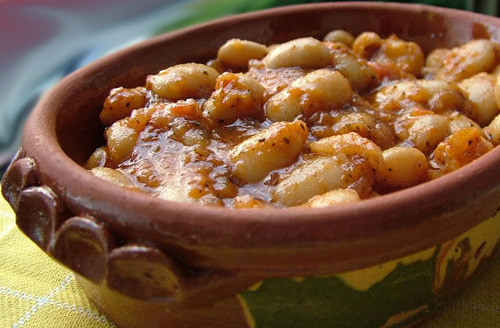Prebranac
Pasulj is a bean soup made of usually white, cranberry or pinto beans, and more rarely kidney beans, that is common in Serbian, Montenegrin, Bosnian and Croatian, Macedonian cuisine (former Yugoslavia). It is normally prepared with meat, particularly smoked meat such as smoked bacon, sausage, and ham hock, and is a typical winter dish. Other commonly used ingredients include carrots and onions. Another version of the dish using baked beans is known as prebranac. It has also spread via the diaspora, and is known in English as Serbian bean soup, and in German-speaking countries as Serbische Bohnensuppe ("Serbian bean soup"). In North Macedonia, a spicy and thicker variant is known as tavče gravče (beans on a skillet).
55 species of the genus Phaseolus are known, five of those are domesticated. This is just one that is most cultivated. Beans (Phaseolus vulgaris) are one of the most important cultivated legumes in the world, due to their high content of protein, carbohydrates and fiber. World production is estimated at 18.7 million tons, and it is grown in almost 150 countries on 27.7 million hectares. The largest producers are Mexico and Brazil, followed by tropical countries in Africa.
The origin of all beans is Central America, primarily Mexico. Based on archaeological findings and variations in the type of phaseolin - a protein in seeds, the scientists concluded that the wild form of common beans spread from Mexico through Ecuador and Colombia all the way to the Andes and Argentina.

In addition to excellent taste, beans are a rich source of protein, potassium, calcium, phosphorus and iron. Because of all its benefits, beans have been used for healing since ancient times. It helps for lowering blood sugar and have proven to be brave warriors in the fight against beetle inflammation. The tree, leaf and flower have long been used as valuable diuretics and the combination of fiber and folic acid plays a notable role in protecting against stroke and heart disease.
The Serbian idiom simply as a bean ("simple as a bean") is easily equated with English as a pie and French as a simple comme chou.
An old traditional prebranac
Prebranac is a dish that is prepared with great pleasure for a fasting meal in a large part of Serbia, and especially in the south, and especially for Christmas Eve. Macedonians like to emphasize that Gravce na tavce is their invention, the south of Serbia claims that only their prebranac is real.
Preparation:
Clean the beans from bad grains, soak them in cold water for a couple of hours and then rinse and cook. That first water is thrown away. Cook the beans again and then pour i tinto the pot, pour water so that it is 3 cm above the beans and cook until soft. You must take good care that the grains do not fall apart, ie. not to overcook. To be safe from that, but also from burning, cook it over a medium or even low heat.
Since you will have plenty of time while cooking, cut the onion into cubes and fry it in oil until it gets a golden brown color. When it cools down a bit, add the spices to it.
Strain the prepared beans, mix with the onion (add one hot pepper, like that - for your soul if you like hot).
Pour into a ceramic or iron deeper pan, add oil and bay leaves and bake for about 2 hours at 180 degrees. During baking, you can stir the beans once or twice so that the baked beans are at the bottom. Do not overdo it so as not to make mashed beans instead of prebranac.
Prebranac is served both hot and cold, as a spicy addition to the rest of your festive table. On weekdays, read: during the rest of the year, it is excellent as a main lunch dish with cabbage salad, baked potatoes and sausage that you can put in the oven when you are not fasting.
The equation is as simple as beans: make prebranac according to our recipe and the pleasure will not be missed!
Ingredients:
1 kg of beans (Tetovac)
1.5 kg of onion
5 bay leaves
Salt
Pepper
2 dcl sunflower oil
2 tablespoons ground allspice
The Serbian idiom prosto kao pasulj ("simple as pasulj") equates to the English as easy as pie and French simple comme chou.












